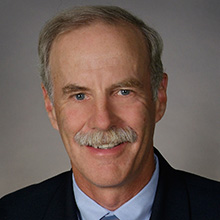Trustee Dick Salmon: Focused on Improving Care

From operating his own family medical practice in New Hampshire, to leading improvements in the quality of care for more than 15 million Americans as national medical director of Cigna HealthCare, Richard (Dick) Salmon, MD, PhD, has seen firsthand the complexity, challenges, and potential of America’s health care system. He now brings his decades of knowledge to Wheeler Health, joining our volunteer board of trustees in January.
However, Salmon is not new to Wheeler or its mission. In 2014, Wheeler recognized him at our “Evening of Wonder” gala for his commitment to building health equity in underserved communities. At the time, there were only two Wheeler Family Health & Wellness Centers—Bristol and Hartford—and Wheeler was not yet a federally qualified health center (FQHC), a challenging certification of quality.
Today, directly serving more than 20,000 patients a year in five FQHCs, including a newly constructed building at One Hope Street in Bristol, times have certainly changed in how we provide care, but Wheeler’s approach to the integration of primary care and behavioral health struck Salmon then and now as precisely the right approach.
“When I retired in 2022, I was looking for ways to contribute to improving health care,” he says. “Throughout my career, working with hundreds of large primary care and multispecialty groups throughout the country, there were only a few that truly integrated mental health professionals or had formal referral relationships. That was it. So I saw that what we offer at Wheeler is truly exceptional nationally, even among the biggest ‘name brand’ health systems.
“Far too often in primary care, mental health care is referred elsewhere; the reality is that many of those patients never make it to their first visit. Likewise, when people seek mental health separately, there is almost no communication back to their primary care. I am a full believer in that integrated model. Wheeler does that in the best way possible. The same electronic health record, the same team, the same roof.”
Salmon says he learned the value of integrating care at the earliest stages of his medical career. He considers himself fortunate that, as a young family practice physician, he was exposed to behavioral health treatments and practitioners, shaping his view of what health meant.
“We all have a bias based on our practice and training. Many physicians did not have the firsthand experience with behavioral health integration that I did, or practiced in an environment where a behavioral health clinician works side by side with primary care providers as a whole team,” he says.
Wheeler’s overall continuum of care, with more than 120 programs serving 90 percent of the state’s cities and towns, also appealed to Salmon, as did our focus on underserved populations across the state.
“Patients are complicated, especially those with social or economic challenges,” he says. “Their lives are often stressful or unstable. They may move or change providers often. They may have both medical and psychosocial issues that traditional providers may overlook. Appropriate care must extend beyond the office visit and prescription pad to consider the patient’s environment and their social and cultural determinants of health.
“When I look at the whole scope of services Wheeler provides, from in-home care to families in distress, to their focus on primary and integrated care, this huge spectrum and range makes a difference. And more importantly, I think Wheeler’s focus on outcomes matters a great deal, especially when it drives program development on that basis. Wheeler is doing not only what feels like the right thing to do but doing it because the data shows IT IS the right thing to do to address overall health outcomes.”





